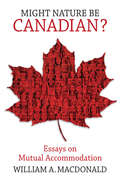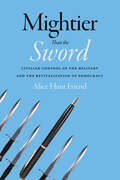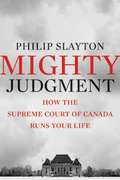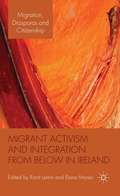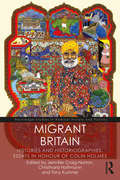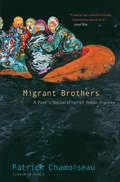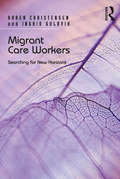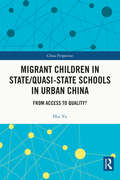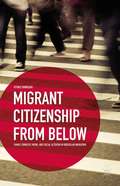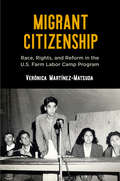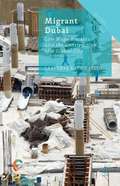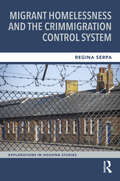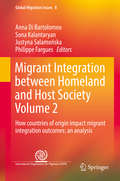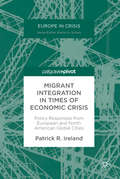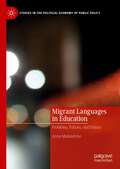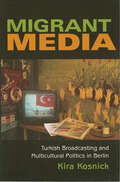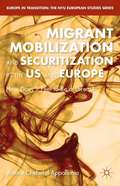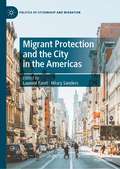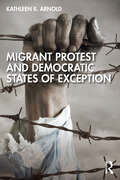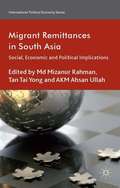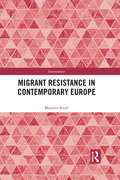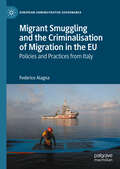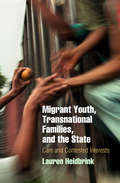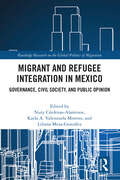- Table View
- List View
Might Nature Be Canadian?: Essays on Mutual Accommodation
by William A. MacdonaldMutual accommodation is about co-operation, compromise, and inclusion. It's a big idea, equal to freedom, science, and compassion. The postwar global economic order led by the United States is one of the greatest historic achievements of mutual accommodation, yet it is now at risk from the centrifugal forces that have led to populism. Today, to many nations and people, Canada is the model country driven by successful mutual accommodation. In Might Nature Be Canadian? William Macdonald explores the theme of mutual accommodation with a close lens on the Canadian experience. Canada has a drive toward mutual accommodation. The United States has a strong drive toward division. There has always been a divergence of ideologies between the two countries. The United States now appears to view the world as a never-ending struggle, which has become greater since 2000, between good and evil, while Canada, by contrast, leans toward the idea that there is an underlying order at the heart of things. Canada has always faced strong limits in creatively overcoming a challenging geography and French/English language differences within its own borders; on the other hand the United States sees itself as a country with virtually no limits. Throughout its history Canada's drive toward mutual accommodation, stronger than that of any other country, has allowed its increasingly diverse citizens to live together peacefully and successfully, even as they retain their own culture, language, and religion. Nature can be described as simultaneously either/or and both/and. Is there something fundamentally Canadian about this? Taking inspiration from British philosopher Alfred North Whitehead, who said that "civilization is the triumph of persuasion over force," Macdonald argues that the urgent spread of mutual accommodation, a charge led by Canada, is central to achieving a bearable world for everyone.
Mightier Than the Sword: Civilian Control of the Military and the Revitalization of Democracy
by Alice Hunt FriendThe civilian role in managing the military has never been more important. Today, civilian leadership of defense policy is challenged by the blurring line between war and competition and the speed of machine decision-making on the battlefield. Moreover, the legitimacy of political leaders and civil servants has been undermined by a succession of foreign policy failures and by imbalances of public faith in the military on the one hand and disapproval of civilian institutions on the other. A central question emerges: What does appropriate and effective civilian control of the military look like? Combining scholarly expertise and firsthand civilian experience in the Department of Defense, Friend argues that civilians combine authoritative status, institutional functions, and political expertise to ensure that democratic preferences over the use of force prevail. Friend focuses on the ways political context shapes whether and how civilian controllers—the civilians in professional and institutional positions with the responsibility for defense matters—exercise control over the military and each other. Mightier Than the Sword provides insights that enrich civil-military relations scholarship, as well as lessons aimed at revitalizing American democracy.
Mighty Judgment
by Philip SlaytonIn "Mighty Judgment" Philip Slayton describes the important issues the Supreme Court decides for individual Canadians and for Canada as a nation, and the surprising and dramatic ways in which these decisions shape our future. In the Morgentaler case (1988), the court struck down laws restricting abortion, leaving Canada the only Western country without any abortion laws. In the Same-Sex Marriage Reference (2004), it decided that gays and lesbians could marry. In the Secession Reference (1998), it laid down the conditions under which Quebec could secede from Canada. In the Patrick case (2009), the court decided that the right of privacy does not stop the police from rifling through our garbage. More recently, the court administered a tongue-lashing to the federal government over its treatment of Canadian youth Omar Khadr, accused by the United States government of fighting with the Taliban. "Mighty Judgment" makes clear that the Supreme Court of Canada is a political institution, and that judges are politicians. But unlike other politicians, judges cannot be voted out of office. Slayton discusses reforms that will be needed, particularly in the way judges are chosen, once we recognize that the court decides policy and plays a pivotal role in governing Canada.
Migrant Activism and Integration from Below in Ireland
by Ronit Lentin Elena MoreoThis book analyzes the interaction between migrant activists and leaders and the state of the Republic of Ireland - a late player in Europe's immigration regime - against the background of an increasingly restrictive immigration regime.
Migrant Britain: Histories and Historiographies: Essays in Honour of Colin Holmes (Routledge Studies in Radical History and Politics)
by Tony Kushner Jennifer Craig-Norton Christhard HoffmannBritain has largely been in denial of its migrant past - it is often suggested that the arrivals after 1945 represent a new phenomenon and not the continuation of a much longer and deeper trend. There is also an assumption that Britain is a tolerant country towards minorities that distinguishes itself from the rest of Europe and beyond. The historian who was the first and most important to challenge this dominant view is Colin Holmes, who, from the early 1970s onwards, provided a framework for a different interpretation based on extensive research. This challenge came not only through his own work but also that of a 'new school' of students who studied under him and the creation of the journal Immigrants and Minorities in 1982. This volume not only celebrates this remarkable achievement, but also explores the state of migrant historiography (including responses to migrants) in the twenty-first century.
Migrant Brothers: A Poet's Declaration of Human Dignity
by Patrick Chamoiseau Matthew Amos Fredrik Rönnbäck“If justice had a Jericho trumpet, Chamoiseau would be it.”—Junot Díaz <P><P>As migrants embark on perilous journeys across oceans and deserts in pursuit of sanctuary and improved living conditions, what is the responsibility of those safely ensconced in the nations they seek to enter? <P>Moved by repeated tragedies among immigrants attempting to enter eastern and southern Europe, Patrick Chamoiseau assails the hypocrisy and detachment that allow these events to happen. Migrant Brothers is an urgent declaration of our essential interconnectedness that asserts the necessity to understand one another as part of one human community, regardless of national origin.
Migrant Care Workers: Searching for New Horizons
by Karen Christensen Ingrid GuldvikIn this beautifully-argued book, Karen Cristensen and Ingrid Guldvik provide a comparatively-based insight to the historical context for public care work and show how migration policies, general welfare and long-term care policies (including the cash-for-care schemes) as well as cultural differences in values in the UK and Norway set the context for how migrant care workers can realise their individual life projects. Through viewing migrants as individuals who actively construct their lives within the options and conditions they are given at any time, they bring to the discussion an awareness of what might be called ’a new type of migrant’ one who is neither a victim of the divide between the global north and the global south, nor someone leaving family behind, but individuals using care work as a part of their own life project of potential self-improvement.
Migrant Children in State/Quasi-state Schools in Urban China: From Access to Quality? (China Perspectives)
by Hui YuHighlighting the changing landscape of Chinese urban state schools under the pressure of recruiting a tremendous number of migrant children, this book examines the quality of state educational provisions from demographic, institutional, familial and cultural angles. Rooted in rich qualitative data from five Chinese metropolitan cities, it identifies the demographic changes in many state schools of becoming ‘migrant majority’ and the institutional reformation of ‘interim quasi-state’ schools under a low cost and inferior schooling approach. This book also digs into the ‘black box’ of cultural reproduction in school and family processes, revealing both a gloomy side of many migrant children’s academic underachievement as a result of troubled home-school relations and a bright side that social inclusion of migrant children in state school promotes their adaptation to urban life. The author concludes that migrant children’s experiences in state (and quasi-state) schools turn them into a generation of ‘new urban working-class’. The monograph will be of interest to scholars, students, practitioners and policymakers who want to better understand educational equality for migrants and other marginalised groups.
Migrant Citizenship from Below
by Kyoko ShinozakiMigrant Citizenship from Below explores the dynamic local and transnational lives of Filipina and Filipino migrant domestic workers living in Sch#65533;nberg, Germany. Shinozaki examines their irregular migrant citizenship status from 'above', which is produced by complex interactions between Germany's welfare, care, and migration regimes and the Philippines' gendered politics of overseas employment. Despite the predominant representation of these workers as invisible, these spatially immobile migrants maintain sustained transnational engagements through parenting and religious practices. Shinozaki studies the reverse-gendered process of international reproductive labor migration, in which women traveled first and were later joined by men. Despite their structural vulnerability, participant observations and biographical interviews with the migrants demonstrate that they enact and negotiate migrant citizenship in the workplace, transnational households, religious practices and through accessing health provisions.
Migrant Citizenship: Race, Rights, and Reform in the U.S. Farm Labor Camp Program (Politics and Culture in Modern America)
by Verónica Martínez-MatsudaAn examination of the Farm Security Administration's migrant camp system and the people it servedToday's concern for the quality of the produce on our plates has done little to guarantee U.S. farmworkers the necessary protections of sanitary housing, medical attention, and fair labor standards. The political discourse on farmworkers' rights is dominated by the view that migrant workers are not entitled to better protections because they are "noncitizens," as either immigrants or transients. Between 1935 and 1946, however, the Farm Security Administration (FSA) intervened dramatically on behalf of migrant families to expand the principles of American democracy, advance migrants' civil rights, and make farmworkers visible beyond their economic role as temporary laborers. In more than one hundred labor camps across the country, migrant families successfully worked with FSA officials to challenge their exclusion from the basic rights afforded by the New Deal.In Migrant Citizenship, Verónica Martínez-Matsuda examines the history of the FSA's Migratory Labor Camp Program and its role in the lives of diverse farmworker families across the United States, describing how the camps provided migrants sanitary housing, full on-site medical service, a nursery school program, primary education, home-demonstration instruction, food for a healthy diet, recreational programing, and lessons in participatory democracy through self-governing councils. In these ways, she argues, the camps functioned as more than just labor centers aimed at improving agribusiness efficiency. Instead, they represented a profound "experiment in democracy" seeking to secure migrant farmworkers' full political and social participation in the United States. In recounting this chapter in the FSA's history, Migrant Citizenship provides insights into public policy concerning migrant workers, federal intervention in poor people's lives, and workers' cross-racial movements for social justice and offers a precedent for those seeking to combat the precarity in farm labor relations today.
Migrant Dubai: Low Wage Workers and the Construction of a Global City (Global Diversities)
by Laavanya KathiraveluMigrant Dubai.
Migrant Homelessness and the Crimmigration Control System (Explorations in Housing Studies)
by Regina SerpaMigrant Homelessness and the Crimmigration Control System offers new insights into the drivers of homelessness following migration by unpacking the housing consequences of ‘crimmigration’ control systems in the US and the UK. The book advances ‘housing sacrifice’ as a concept to understand journeys in and out of homelessness and the coping strategies migrants employ. Undergirded by persuasive empirical research, it offers a compelling case for a ‘social citizenship’ right to housing guaranteed across social, political and civil realms of society. The book is structured around the 30 life stories of people who have migrated to the capital cities of Boston and Edinburgh from Central America and Eastern Europe. The narratives are complemented by interviews with a range of stakeholders (including frontline caseworkers, activists and policymakers). Guided by the tenets of critical realist theory, this book offers a biographical inquiry into the intersections of race, class and gender and provides insight into the everyday precarity homeless migrants face, by listening to them directly. It will be of interest to students, scholars, and policymakers across a range of fields including housing, immigration, criminology, sociology, and human geography.
Migrant Homelessness and the Crimmigration Control System (ISSN)
by Regina SerpaMigrant Homelessness and the Crimmigration Control System offers new insights into the drivers of homelessness following migration by unpacking the housing consequences of ‘crimmigration’ control systems in the US and the UK. The book advances ‘housing sacrifice’ as a concept to understand journeys in and out of homelessness and the coping strategies migrants employ. Undergirded by persuasive empirical research, it offers a compelling case for a ‘social citizenship’ right to housing guaranteed across social, political and civil realms of society. The book is structured around the 30 life stories of people who have migrated to the capital cities of Boston and Edinburgh from Central America and Eastern Europe. The narratives are complemented by interviews with a range of stakeholders (including frontline caseworkers, activists and policymakers). Guided by the tenets of critical realist theory, this book offers a biographical inquiry into the intersections of race, class and gender and provides insight into the everyday precarity homeless migrants face, by listening to them directly. It will be of interest to students, scholars, and policymakers across a range of fields including housing, immigration, criminology, sociology, and human geography.
Migrant Integration between Homeland and Host Society Volume 2
by Philippe Fargues Anna Di Bartolomeo Sona Kalantaryan Justyna SalamońskaThis book provides solid empirical evidence into the role that countries and communities of origin play in the migrant integration processes at destination. Coverage explores several important questions, including: To what extent do policies pursued by receiving countries in Europe and the US complement or contradict each other? What effective contribution do they make to the successful integration of migrants? What obstacles do they put in their way? This title is the second of two complementary volumes, each of which is designed to stand alone and provide a different approach to the topic. Here, renowned contributors present evidence from the studies of 55 origin countries on five continents and 28 countries of destination in Europe where both quantitative and qualitative research was conducted. In addition, the chapters detail results of a unique worldwide survey of 900 organisations working on migrant integration and diaspora engagement. The results draw on an innovative methodology and new approaches to the analysis of large-scale survey data. This examination into the tensions between integration policies and diaspora engagement policies will appeal to academics, policymakers, integration practitioners, civil society organisations, as well as students. Overall, the chapters provide empirical evidence that builds upon a theoretical framework developed in a complementary volume: Migrant integration between Homeland and Host society. Vol. 1. Where does the country of origin fit? by A. Unterreiner, A. Weinar. and P. Fargues.
Migrant Integration in Times of Economic Crisis
by Patrick R. IrelandThis book examines how the severe economic downturn following the 2007-2008 financial crisis affected the structural integration and quality of life of urban migrants in Europe and North America. It compares the experiences of migrants from Poland, Romania, Serbia, Pakistan, and Ghana in five similar, secondary global cities of Hamburg (Germany), Barcelona (Spain), Chicago (USA), Toronto (Ontario, Canada), and Montr#65533;al (Qu#65533;bec, Canada) over the period of 2000-2015. The work uses statistical analysis to gauge changes in residential segregation and structural integration (such as unemployment, poverty, and social assistance rates). It then provides qualitative analyses of individual city neighborhoods where the target migrant groups have settled, exploring each community's unique evolution and the ambivalent impact that local policy responses have had on their quality of life. With this study, researchers, instructors, students, and policymakers with an interest in migration, urban development, and global cities will be far more knowledgeable of both the potential and limits of policy efforts.
Migrant Languages in Education: Problems, Policies, and Politics (Studies in the Political Economy of Public Policy)
by Anna MalandrinoThis book examines language education policy in European migrant-hosting countries. By applying the Multiple Streams Framework to detailed case studies on Austria and Italy, it sheds light on the factors and processes that innovate education policy. The book illustrates an education policy design that values language diversity and inclusion, and compares underlying policymaking processes with less innovative experiences. Combining empirical analysis and qualitative research methods, it assesses the ways in which language is intrinsically linked to identity and political power within societies, and how language policy and migration might become a firmer part of European policy agendas. Sitting at the intersection between policy studies, language education studies and integration studies, the book offers recommendations for how education policy can promote a more inclusive society. It will appeal to scholars, practitioners and students who have an interest in policymaking, education policy and migrant integration.
Migrant Media: Turkish Broadcasting and Multicultural Politics in Berlin (New Anthropologies of Europe)
by Kira KosnickIn this innovative and thought-provoking study, Kira Kosnick explores the landscape of Turkish-language broadcasting in Berlin. From 24-hour radio broadcasting in Turkish to programming on Germany's national public broadcasting and local public access channels, Germany's largest immigrant minority has made its presence felt in German media. Satellite dishes have appeared in migrant neighborhoods all over the city, giving viewers access to Kurdish channels and broadcasts from Turkey. Kosnick draws on interviews with producers, her own participation in production work, and analysis of programs to elaborate a new approach to "migrant media" in relation to the larger cultural and political spaces through which immigrant life is imagined and created.
Migrant Mobilization and Securitization in the US and Europe: How Does It Feel to Be a Threat? (Europe in Transition: The NYU European Studies Series)
by Ariane Chebel D’appolloniaImmigrants and minorities in Europe and America have responded in diverse ways to security legislation introduced since 9/11 that targets them, labeling them as threats. This book identifies how different groups have responded and explains why, synthesizing findings in the fields of securitization, migrant integration, and migrant mobilization.
Migrant Protection and the City in the Americas (Politics of Citizenship and Migration)
by Laurent Faret Hilary SandersThis book aims to establish a dialogue around the various “urban sanctuary” policies and other formal or informal practices of hospitality toward migrants that have emerged or been strengthened in cities in the Americas in the last decade. The authors articulate local governance initiatives in migrant protection with a larger range of social and political actors and places them within a broader context of migrations in the Western Hemisphere (including case studies of Toronto, New York, Austin, Mexico City, and Lima, among others). The book analyzes in particular the limits of local efforts to protect migrants and to identify the latitude of action at the disposal of local actors. It examines the efforts of municipal governments and also considers the role taken by cities from a larger perspective, including the actions of immigrant rights associations, churches, NGOs, and other actors in protecting vulnerable migrants.
Migrant Protest and Democratic States of Exception
by Kathleen R. ArnoldRecognizing the radical disparity between migration/border policy and constitutional law "inside these borders," Kathleen R. Arnold focuses on two main forms of migrant protest to explore the meaning of resistance in a sovereign context: self-harming protest by detainees and faith-based sanctuary of individuals scheduled for detention. This activism creates a "democratic state of exception," interrupting the legal process, altering discretionary forms of sovereign power, and enacting rights not formally granted; these efforts go beyond the assertion of liberal rights or merely restoring the rule of law (even if these are goals), challenging the warfare state while constituting a demos that is formally illegible. Migrant Protest and Democratic States of Exception will be of interest to scholars, migrant advocacy professionals (including INGO and IGO officers), graduate students, and advanced undergraduate students in a variety of fields from legal studies to forced migration and refugee studies; political science, human rights, protest history and contemporary movements.
Migrant Remittances in South Asia: Social, Economic and Political Implications (International Political Economy Series)
by Md Mizanur RahmanThis volume provides theoretical treatments of remittance on how its development potential is translated into reality. The authors meticulously delve into diverse mechanisms through which migrant communities remit, investigating how recipients engage in the development process in South Asia.
Migrant Resistance in Contemporary Europe (Interventions)
by Maurice StierlOver the past few years, increased ‘unauthorised’ migrations into the territories of Europe have resulted in one of the most severe crises in the history of the European Union. Stierl explores migration and border struggles in contemporary Europe and the ways in which they animate, problematise, and transform the region and its political formation. This volume follows public protests of migrant activists, less visible attempts of those on the move to ‘irregularly’ subvert borders, as well as new solidarities and communities that emerge in interwoven struggles for the freedom of movement. Stierl offers a conceptualisation of migrant resistances as forces of animation through which European forms of border governance can be productively explored. As catalysts that set socio-political processes into frictional motion, they are developed as modes of critical investigation, indeed, as method. By ethnographically following and being implicated in different migration struggles that contest the ways in which Europe decides over and enacts who does, and does not, belong, the author probes what they reveal about the condition of Europe in the contemporary moment. This work will be of great interest to students and scholars of Migration, Border, Security and Citizenship Studies, as well as the Political Sciences more generally.
Migrant Smuggling and the Criminalisation of Migration in the EU: Policies and Practices from Italy (European Administrative Governance)
by Federico AlagnaThis book examines migrant smuggling and migration governance in the European Union. Following the 'refugee crisis' of 2014-15 and the rise in the number of people crossing the Mediterranean Sea, growing concern has been expressed in the media and elsewhere as to how EU institutions have tackled migrant smuggling. Focusing particularly on Italy during the period of the Eighth European Parliament (2014-19), the book assesses the evolution of anti-smuggling policies at EU and national level, and considers why institutions and policy-makers have failed to fully address the issue. Adopting a bottom-up approach, it also analyses the roles that people on the move, smugglers, law enforcers, the judiciary and border guards play in influencing policy processes. With political and public debates over migration more vociferous than ever, the book provides important insights into the EU approach to migrant smuggling. It will appeal to all those interested in public policy, migration studies, European politics and criminology.
Migrant Youth, Transnational Families, and the State: Care and Contested Interests (Pennsylvania Studies in Human Rights)
by Lauren HeidbrinkEach year, more than half a million migrant children journey from countries around the globe and enter the United States with no lawful immigration status; many of them have no parent or legal guardian to provide care and custody. Yet little is known about their experiences in a nation that may simultaneously shelter children while initiating proceedings to deport them, nor about their safety or well-being if repatriated. Migrant Youth, Transnational Families, and the State examines the draconian immigration policies that detain unaccompanied migrant children and draws on U.S. historical, political, legal, and institutional practices to contextualize the lives of children and youth as they move through federal detention facilities, immigration and family courts, federal foster care programs, and their communities across the United States and Central America.Through interviews with children and their families, attorneys, social workers, policy-makers, law enforcement, and diplomats, anthropologist Lauren Heidbrink foregrounds the voices of migrant children and youth who must navigate the legal and emotional terrain of U.S. immigration policy. Cast as victims by humanitarian organizations and delinquents by law enforcement, these unauthorized minors challenge Western constructions of child dependence and family structure. Heidbrink illuminates the enduring effects of immigration enforcement on its young charges, their families, and the state, ultimately questioning whose interests drive decisions about the care and custody of migrant youth.
Migrant and Refugee Integration in Mexico: Governance, Civil Society, and Public Opinion (Routledge Research on the Global Politics of Migration)
by Nuty Cárdenas-Alaminos Valenzuela Moreno, Karla A. Liliana Meza-GonzálezAlthough Mexican emigration to the United States is still relevant, it has also become a return, transit, and recipient country for thousands of refugees. Now, many of these migrants, refugees, and their families stay on Mexican soil territory, trying to integrate within Mexican society.This book brings together leading experts in Mexico and covers the political dimension of integration for migrants in Mexico analyzing integration policies, civil society efforts, and public opinion from various angles. In this context, many questions arise. Among the most relevant: What has the federal government done to assist these migrant groups, who often arrive in conditions of great vulnerability? What policies have been implemented at the subnational level of government to adequately integrate these population groups? What actions have been implemented by other local actors, such as civil society organizations? What do Mexicans think about newcomers? Immigrant integration in Mexico will be of interest to students and scholars across a range of disciplines including international relations, development studies, anthropology, international studies, sociology, and Latin American studies.
